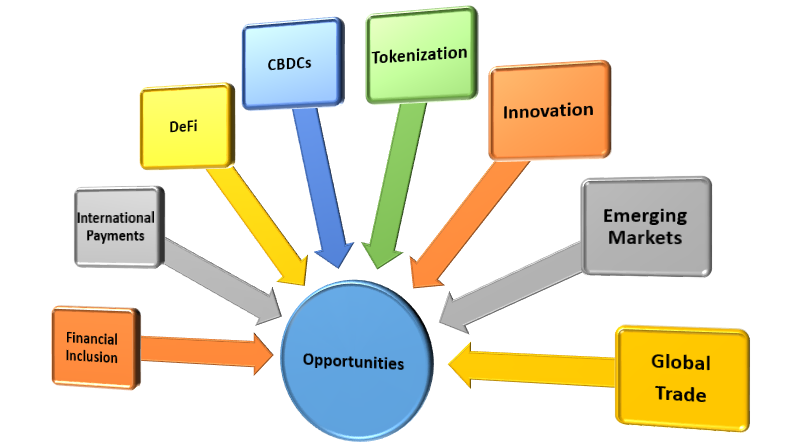Cryptocurrencies have seen many ups and downs since its inception in 2009. Undoubtedly, cryptocurrencies have brought about a revolution in both the digital and financial domains. Bitcoin, released in 2009, has exceeded 68,000 USD in 2021; now, it has bounced back from less than 15,000 USD to more than 60,000 USD. Considering the future of cryptocurrencies, it depends on various multidisciplinary factors. Frequent rises and declines raised questions in people’s minds about their futures. The unpredictability of cryptocurrency’s value is the main impediment to its future mainstreaming. However, the recent rise in acceptance from mainstream bodies gives way to a bright future.
Related: Best performing cryptocurrencies in 2023
Opportunities for Cryptocurrencies
Indeed, many factors are responsible for shaping crypto’s future. Hence, all these factors must be thoroughly considered to gauge the future of cryptocurrencies.
1. Adoption by Mainstream Entities
How global economy is going to act in 2024?
The future of cryptocurrencies highly depends on mainstream adoption by states, financial institutions, international organizations, etc. Only two countries (El Salvador and the Central African Republic) have officially recognized Bitcoin as a legal tender. Moreover, trading cryptocurrencies in the EU with 21 other countries is legal. Many countries from Africa and China still prohibit cryptocurrencies from being used and traded.

The rise in interest among global financial institutions like Blackstone and the predilection of Elon Musk has raised hopes of a better future for cryptocurrencies. In January 2024, the US SEC approved the first-of-its-kind exchange-traded fund (ETF) to track the BTC. This is considered the most crucial step towards the mainstreaming of cryptocurrencies. The development and clarity of blockchain technology will attract the remaining mainstream entities and ultimately be an integral part of the financial ecosystem.
2. Cryptocurrencies can Ease Global Trade: An Alternative to Traditional Money
Global trade is too dependent on the US dollar; any untoward financial calamity or economic crisis in the US can collapse the whole international trade infrastructure. Moreover, the US government controls the USD, so naturally, the US government has a monopolistic role in global trade. No central authority controls/ governs cryptocurrencies, so there will be no monopolistic entity influencing international trade. Furthermore, cryptocurrencies are less likely to be affected by an economic crisis in a single country. So, cryptocurrencies can provide a suitable means of exchange/ money in global trade.
Related: How to invest in cryptos in 2024?
3. Rising Trend of Central Bank Digital Currencies (CBDCs)
CBDCs are digital currencies countries’ central banks issue to facilitate transactions according to modern needs. Traditionally, central banks issue and regulate the national currency of respective countries. Currently, there is a rising trend for governments to issue CBDCs. Around 11 countries have already opted for CBDCs, and around 100 countries are in the development stages, according to the Atlantic Council. However, CBDCs are different from cryptocurrencies; still, they can be considered precursors for the mainstream adoption of cryptocurrencies.
Related: Types of Cryptocurrencies
4. Growing Internet Banking and Decentralized Financing
Digitization of the financial ecosystem has accelerated in the post-pandemic era. The concepts of virtual banking and decentralized financial technology are evolving rapidly. Virtual banks are financial institutions that operate only in the cyber domain (on the internet) without any physical presence. They provide almost all the facilities that traditional banks offer. Meanwhile, DeFi is a different technology altogether; it is based on the decentralization of blockchain technology. It aims to develop protocols for transactions without the involvement of central authorities. There is a surge in both of these technologies, which is a good omen for cryptocurrencies.
5. Ease in Cross Border Payments
According to the World Bank, remittance flows have reached $669 billion in 2023. Traditional banking systems and payment mechanisms do not offer a smooth money flow. The time to make an international/cross-border transaction spans days or weeks. Additionally, high taxes and commissions are involved in traditional systems. In contrast, cryptocurrencies offer solutions to the challenges associated with them. Intermediaries are one of the significant impediments to cross-border payments; cryptocurrencies will remove the role of intermediaries altogether.

Challenges for Cryptocurrencies
Everything is not smooth sailing for cryptocurrencies. There are numerous challenges for their future, from their innate characteristics to geopolitical concerns.
1. Uncertainty in Regulations
Till now, only two countries in the world have accepted BTC as legal tender out of 193 nations. Although many other countries are working on it, cryptocurrencies are still banned in many developed and developing countries. According to Coinmap, over 15,000 businesses directly or indirectly accept BTC. This is the case of the spearhead of cryptocurrencies; if we consider the second biggest cryptocurrency, ETH, the number plunges to only 5,000 business entities. The future of cryptocurrencies heavily depends on mainstream adoption by countries and business entities.
2. Volatility in Value

Prices of cryptocurrencies fluctuate too often and too steeply. The core reason behind the acceptability issue of cryptos is their high volatility. For example, BTC peaked in November 2021, hitting an all-time high ($ 68,000), and suddenly lost half its value within months. It has recovered from its lowest in recent times (less than $15,000) to more than $60,000 in just a few months. This volatility makes the general public skeptical about the future of cryptocurrencies and financial experts, financial entities, and governments.
3. The Issues of Scalability
Blockchain technology is still in its development stages. With a need for more research to unfold the actual capacity of blockchain technology, it has faced issues in handling large amounts of transactions. To be a reliable means of exchange, cryptocurrencies need to resolve the issue of scalability. Layer-two mechanisms and consensus-based solutions achieve this to enhance the blockchain’s speed and handling capacity. Additionally, cryptocurrencies only operate/ can be used where high-speed internet is available. One-third of the global population will not have access to cryptocurrencies until everyone has access to the internet.
4. Challenges in Security and Clarity
People are attracted to cryptocurrencies primarily for security, privacy, and anonymity. Blockchain technology uses cryptography and decentralised networks to back security mechanisms, but the transactions need more clarity. Hackers have frequently targeted crypto wallets and the number is increasing with each passing day. To avoid such attacks, further security improvements are needed. Anonymity is causing hurdles in mainstreaming cryptocurrencies; reputed crypto trading platforms use KYC mechanisms to enhance transaction clarity. All the participants of a network can see the transaction in the network. Further developments are underway to make networks more secure and transparent.
5. Environmental Concerns
Related: Economic impacts of climate change
Energy is required for every network rather than only one centralized network, as in traditional networking systems, to sustain decentralized networks. This means it is a high-energy-consuming technology. Recent mining activities in cryptocurrencies have further aggravated the situation. A study showed that more than 85 mt CO2 was emitted during the mining of Bitcoin in 2020-2021. Many countries have banned mining because of the massive consumption of energy. Currently, the world is shifting towards energy-efficient technologies with minimalistic Carbon footprints. However, cryptocurrencies pose environmental concerns that may hamper their development. Additionally, there are concerns about water footprints.

Bottom Line
The future of Cryptocurrencies depends on many factors. Although, many mainstream entities are skeptical about cryptocurrencies primarily due to volatility and security concerns. Still, the good thing is that cryptocurrencies are overcoming the hurdles with the latest developments in blockchain technology. However, many impediments still exist for cryptocurrencies to become mainstream assets or means of exchange.

[…] Related: Future of cryptocurrencies: Challenges and Opportunities […]
yTJvqukpBj
[…] The future of cryptocurrencies: Challenges and Opportunities […]